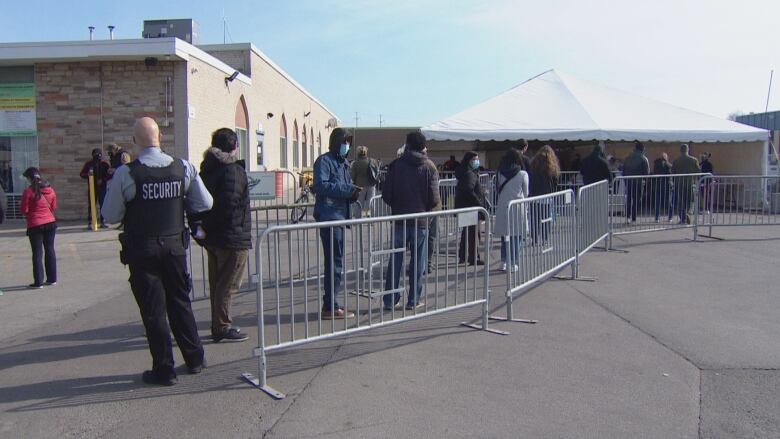How community advocates in COVID-19 hotspots are working to get the vaccine message out
In addition to mass vaccinations centres, mobile and pop up clinics help get into at-risk communities

From churches and mosques to grassroots community groups, organizations on the ground in Toronto hot spots are mobilizing to help get people vaccinated against COVID-19, especially in neighbourhoods where opportunities to get the shot are harder to come by than in wealthier areas.
The Ontario government has adjusted its vaccine rollout plan to target priority neighbourhoods using mobile and pop-up clinics in addition to mass vaccination clinics
Over the weekend, a clinic was held at Masjid Darussalam Thorncliffe Mosque, one of 111 neighbourhoods in Toronto that have been disproportionately hard hit by the pandemic.
The lineup for the 1,000 shots available stretched down the block from the clinic set up in the parking lot of the mosque. Some said they'd been waiting for hours. Arun Chowdry didn't seem to mind.

"It's a big lineup here. I come here for the vaccination because the vaccine saves lives," he says.
The province designated this east end neighbourhood and about a hundred others in Toronto as a hotspot. It's a community with many newcomers working low wage essential jobs — and high case numbers.
The province has opened the eligibility for vaccines based on postal codes, with many cases where mobile or pop up sites will be set up in faith-based locations, community centers and workplaces.
These clinics offer COVID-19 vaccines to anyone over the age of 18 — without an appointment, as opposed to the online booking system to get a shot at a mass vaccination centre and only for eligible age groups.
"I think for some of the more vulnerable populations, they should do appointment-based, but for the rest of us, this is fine," says Jeff Lung, who was in line at the Masjid Darussalam Thorncliffe Mosque.

Jen Quinlan of Flemingdon Health Centre, which set up a pop up clinic in another priority neighbourhood in a mall parking lot, says in some communities, pre-booking did not work.
"We were hearing from community members that that was a huge barrier, especially for folks who work shifts and who aren't able to take time off to both book the appointment through a long, rigorous process, as well as then attend the appointment," she says.
"We promoted locally, so we printed flyers and posted them around the neighborhood. We went to social media, used Whatsapp groups and we let local folks know that there is an opportunity for them to access the vaccine with very little barrier and that they just needed to show up and line up."
Quinlan says the community-based model is meant to address some of the systemic barriers that some communities have experienced throughout the pandemic, where essential workers who work as cab drivers or in factories were unable to get quick and easy access to the vaccine.
Not only were the people in some of these communities more at risk, because they often did essential work, but they had less access to vaccines to protect against COVID-19.
CBC News mapped out the pharmacies in the city that are offering vaccinations, and found they are primarily in Toronto's most affluent neighbourhoods. This has created vaccine desserts in parts of the city, including Toronto's northwest end, which is home to many essential workers, low-income people and multi-generational households.
Vhil Castillejo, manager of community well-being at Jane/Finch Community and Family Centre, says mobile and pop up vaccination clinics in the city's northwest are a welcome sight.
"The Jane and Finch Centre and surrounding community has been asking for this for a very long time, several months to a year," says Castillejo. "And while it's exciting to see this happening, there are also still some barriers that are present and we wish that this were implemented earlier."
Toronto Mayor John Tory says the city will be supporting local community efforts with their local hospital health teams in addition to opening more mass vaccinations centres.
Along with nine city-run clinics, booking appointments for those aged 55 and older and 50 and older in hotspot neighbourhoods, the city will help expand hotspot pop up clinics where all those 18 and older are eligible to get vaccinated.
"They are happening now and have happened over the course of this weekend and into next week in a number of those postal code neighbourhoods, but we want to make access to vaccination for those people even easier and we're working at that," Tory said.
There were 34 clinics held over the weekend and more are planned, he said.
"We are actively working with our health partners and hospitals to open more pop up and mobile clinics to make sure that we get a shot in the arms of as many residents as possible in these hotspot neighbourhoods."
Tory said an announcement to expand mobile and pop up vaccination clinics would be coming soon. Communities have asked they be expanded to workplaces and apartment complexes. The leaders of churches, temples and mosques have offered to host such clinics.
The Catholic Archdiocese of Toronto told CBC Toronto it expressed a willingness to open its 225 Catholic churches in the Greater Toronto Area to help where possible.

